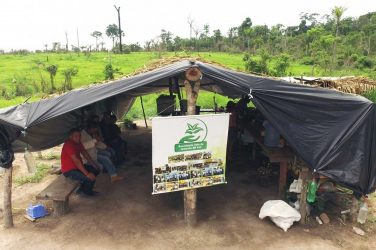 Brazilian President Michel Temer announced that he will combat rumors flying around the streets and social media in Brazil that his government would cut the workers’ rights. According to the president, the release of such information “creates problems” for the government.
Brazilian President Michel Temer announced that he will combat rumors flying around the streets and social media in Brazil that his government would cut the workers’ rights. According to the president, the release of such information “creates problems” for the government.
According to Temer, no government would be “so stupid” to rise to power to cut the workers’ rights. “It is very unpleasant to think that a government would be so stupid to rise to power to limit the workers’ right and put an end to health and education. This kind of rumor spreads and circulates in the extraordinary intensity of social media.”
Temer says it is necessary to “combat” this kind of false information that divides the country. “We will not allow this. We do not want bad [things] for the country. It’s quite the opposite. From the beginning, everybody knows that I suggest the peace and national unification.”
The president also asked for the lawmakers’ help to combat critics. “Deputies and senators may take the word and refute those who disregard, diminish and lessen facts, simply and solely to say that the government is not concerned with health and education.”

US$ 300 Million for Health
Brazil’s Health Minister, Ricardo Barros, announced the transfer of US$ 300 million to enable the provision of 1,401 new services in health facilities and non-profit hospitals, to pay for 99 Emergency Care Units (UPA), and to increase the supply of medicines and technologies.
According to Barros, the value was held thanks to actions of greater efficiency of public spending, like savings in contracts and rents, and jobs cut in the ministry, and it will exert no impact on the budget.
The transfers to fund the UPAs will begin to be paid in October, a total of US$ 55.2 million a year. Thereby, all the emergency care units that operated without money from the ministry will now receive monthly transfers.
A total of US$ 112.5 million per year will be allocated to fund 1,401 new services in health facilities and non-profit hospitals. According to the minister, licenses and credentials will benefit 216 hospitals. The government aims to pay them until December.
By increasing the supply of medicines and vaccines, the government will actually provide more 7.4 million inputs to the Brazilian Unified Public Health Care System, known as SUS.
According to the ministry, the sector will also receive a contribution of US$ 67.33 million for developing meningococcal vaccine in Brazil.
“We are doing more with less,” pointed out Barros, when outlining the government’s strategy to reduce the size of the government apparatus and to improve efficiency by implementing more advanced systems.
Pension Reform Priority
Brazil’s Chief of Staff Eliseu Padilha said the government changed its strategy regarding its plans to carry out reforms this year. According to him, the government will focus its efforts on fiscal adjustment and the pension reform, “the two key topics.”
Padilha said the federal government will not take further action on the proposed labor and political reforms. “We are not taking further steps now. The labor reform is moving ahead by itself, we don’t need to take any action, the Executive (branch) can stay away. The political [reform] is also going on its own,” he said.
Growth with Social Inclusion
Brazilian economists have published a letter at the beginning of the month advocating a resumption of economic growth that preserves social inclusion advancements from recent years and improves income distribution and calling for changes in the tax system.
“Brazil needs to resume growth as soon as possible, but not at all costs,” read a statement released by the COFECON-CORECON federal and regional economics regulatory boards.
According to the economists’ letter, the reason for the “overwhelming poverty” in Brazil is “extreme income concentration”. The authors mentioned the tax system as an underlying cause of income concentration.
“The growing social demands cannot be addressed without changing our archaic tax system that focuses 72% of tax collection on consumption (56%) and income from work (16%), leaving taxes on capital interest and wealth with only 28%, which goes against the global norm,” the document read.
The statement pointed out that by approving the 1988 Constitution, Brazil chose a welfare and public education system, and that “inherently requires an ever-growing amount of resources”. The economists criticized the perception that public spending is the culprit of the economic crisis.
“It is this [welfare] system that prevents severe declines in GDP and employment levels from creating hordes of destitutes and leading to supermarket looting and rioting in city outskirts,” the document read.
The economists have also criticized proposals from President Michel Temer’s administration to amend the constitution to limit the annual increase in public spending to the inflation rate from the previous year.
ABr



